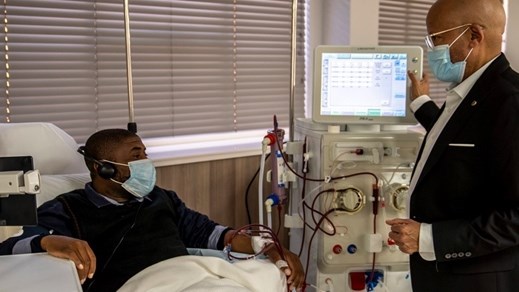Central SA
Mediclinic Renal Services provides expert care to patients─── 14:05 Wed, 08 Mar 2023
Sponsored14:05 Wed, 08 Mar 2023
Mediclinic Renal Services recently launched their services with the opening of Mediclinic Bloemfontein Renal Services, located close to the main hospital.
It is envisioned that the services will target many areas where these services have previously not been easily accessible with the addition of units that are not attached to acute hospitals, but also those based in the communities requiring this care.
Mid-Morning Magic's Yolanda Maartens spoke to Dr Riaan Flooks, a nephrologist based at Mediclinic Bloemfontein,
Flooks outlines the experience and expertise being offered at this convenient location: “I qualified as a nephrologist in 2008, from the University of the Free State but my passion for nephrology started in 1999, whilst working at Livingstone Hospital in Port Elizabeth. After completing my Community Service Training, I joined the ICU and Renal Unit, back at Livingstone Hospital.” In addition to his training in nephrology, Dr Flooks also had the opportunity to work within Transplant Nephrology in Belgium, under the guidance of Prof. B Maes.
As part of the expertise that will be offered at each Mediclinic Renal Services unit, a qualified nephrologist will operate as Medical Director within the unit. Dr Flooks fulfils this role at Mediclinic Bloemfontein Renal Services, “I am the consulting nephrologist at the unit; and my role is to attend to any acute or chronic renal failure complications. I will also attend to the acute non-renal related problems that the dialysis patients may develop. The dialysis unit is close to the hospital in which I am working, and access is streamlined and swift.”
The unit offers both acute and chronic-haemodialysis, as well as the less well-known peritoneal dialysis. They also evaluate patients for a transplant work-up. Dr Flooks explains that the current pressure on renal services is often driven by Diabetes Mellitus, with type 2 Diabetes Mellitus making up the largest portion of this group experiencing renal failure. Hypertension and HIV are also contributing factors to renal failure, however it is the current COVID-19 pandemic that is causing a large number of acute kidney injuries.
His warning for the community is that renal disease is a silent one, where most of the time, patients only present for care with life-threatening complications such as pulmonary edema (excess fluid on the lungs) and elevated potassium levels. He believes that it is essential to train community healthcare workers, GPs and other healthcare workers in the renal industry how to detect renal disease at a much earlier stage. They should be managed with lifestyle changes, managing aspects such as obesity, lack of exercise, salt intake, smoking, alcohol consumption and promiscuity.
Recognising that renal care is a long term relationship between service provider and the patient, Mediclinic Bloemfontein Renal Services offers a number of unique, personal service offerings for their patients. For the long haemodialysis sessions, which are usually 4 hours, 2-3 times a week, they have provided an individual tablet with wifi access per dialysis station, where each patient can enjoy their own entertainment in privacy.
“Our dialysis centres are designed in such a way as to enhance patient experience and comfort while ensuring social distancing. We offer the best in technology and patient care – from our state of the art haemodiafiltration machines, to our point of care pathology pilot programme,” says Dr Flooks.
He continues, “The daily body composition analysis allows staff to assess the patient’s hydration levels in under 20 seconds. Skeletal mass can be evaluated and monthly trends can be reviewed to ensure that the best and most appropriate care is delivered. Our vision with this product is to ultimately have healthier patients with fewer hospitalisations due to fluid related complications. Ultimately saving the patients and funders unnecessary costs.”
The point of care analysis refers to the team’s ability to perform pathology testing throughout the year without having an impact on their medical savings account. Tests that can be performed monthly include Potassium, Sodium, Chloride, Magnesium, Calcium, Phosphorus, Carbon Dioxide, Creatinine, Uric Acid, Urea, amongst others.
“I believe that the relationship that Mediclinic is growing, both on a local and national level, and this will create an exponential growth in the availability of quality renal services,” concludes Dr Flooks. And with the focus on driving services in areas that have not previously enjoyed local access, Mediclinic Renal Services looks forward to opening a number of new units before the end of 2021.













